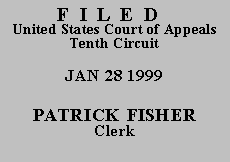 UNITED STATES COURT OF APPEALS
UNITED STATES COURT OF APPEALS
 UNITED STATES COURT OF APPEALS
UNITED STATES COURT OF APPEALS
TENTH CIRCUIT
| RIC J. SISNEY, | |
| v. | No. 98-3281 |
| WYANDOTTE COUNTY DETENTION CENTER; J.B. HOPKINS, Jail Administrator, Wyandotte County Detention Center; MICHAEL S. DAILEY, Sheriff, Wyandotte County Detention Center; F. CHARLES DUNLAY, Assistant Counsel, Wyandotte County Detention Center; NICK A TOMASIC, District Attorney; FLOYD GARNER, Classification Manager, Wyandotte County Detention Center; JOSEPH CONNER, Business Manager, Wyandotte County Detention Center, | (D.C. No. 98-3251)
(D. Kan.) |
ORDER AND JUDGMENT(*)
Before SEYMOUR, Chief Judge, BALDOCK, and HENRY, Circuit Judges.(**)
Plaintiff Ric J. Sisney appeals the district court's sua sponte dismissal without prejudice of his 42 U.S.C. § 1983 civil rights complaint for failure to exhaust administrative remedies. Our jurisdiction arises under 28 U.S.C. § 1291.
Plaintiff is a pretrial detainee housed at the Wyandotte County Detention Center in Kansas City, Kansas. Plaintiff's complaint challenges numerous aspects of the conditions of his confinement at the detention center. The district court, before Defendants were served with process, dismissed the complaint without prejudice pursuant to 42 U.S.C.
§ 1997e for failure to exhaust administrative remedies. We review the district court's dismissal under § 1997e de novo. See Basham v. Uphoff, No. 98-8013, 1998 WL 847689, at *2 (10th Cir. Dec. 8, 1998) (unpublished). Applying this standard, we vacate the district court's order and remand for further proceedings.
Section 1997e(a) of the Prison Litigation Reform Act of 1995, states that "[n]o action shall be brought with respect to prison conditions under section 1983 of this title, or any other Federal law, by a prisoner confined in any jail, prison, or other correctional facility until such administrative remedies as are available are exhausted." 42 U.S.C.
§ 1997e(a). Plaintiff's complaint states that he "has previously sought informal and formal relief from the administrative officials regarding some of the acts complained
of . . . [and] has filed grievances and written letters to the defendants. A lot of the grievances have went [sic] unanswered; the ones that have been answered deny any wrongdoing. Most of the responses say they are within the law." The district court concluded that based on these statements "it does not appear plaintiff has fully exhausted the administrative grievance procedures available to inmates at the detention center." We conclude that the district court acted prematurely in dismissing Plaintiff's complaint.
Reviewing Plaintiff's pro se complaint liberally, see Peterson v. Shanks, 149 F.3d 1140, 1143 (10th Cir. 1998), we conclude that Plaintiff's statements regarding exhaustion of his administrative remedies are sufficient to withstand dismissal under
§ 1997e(a) at this stage of the proceedings. See Basham, 1998 WL 847689, at * 4, (holding that where plaintiff has alleged exhaustion with sufficient specificity, dismissal is improper under § 1997e(a)).
Upon remand, the district court may direct service upon Defendants and the submission of a report under Martinez v. Aaron, 570 F.2d 317 (10th Cir. 1978), in order to allow the district court to determine whether Plaintiff failed to exhaust administrative
remedies. The district court, of course, may screen Plaintiff's claims pursuant to 42 U.S.C. § 1915A to determine whether the complaint should be dismissed as frivolous.
VACATED and REMANDED for further proceedings consistent with this order and judgment.
Entered for the Court,
Bobby R. Baldock
Circuit Judge
*. This order and judgment is not binding precedent, except under the doctrines of law of the case, res judicata, and collateral estoppel. The court generally disfavors the citation of orders and judgments; nevertheless, an order and judgment may be cited under the terms and conditions of 10th Cir. R. 36.3.
**. After examining the briefs and appellate record, this panel has determined unanimously that oral argument would not materially assist the determination of this appeal. See Fed. R. App. P. 34(a)(2)(C); 10th Cir. R. 34.1(G). The case is therefore ordered submitted without oral argument.